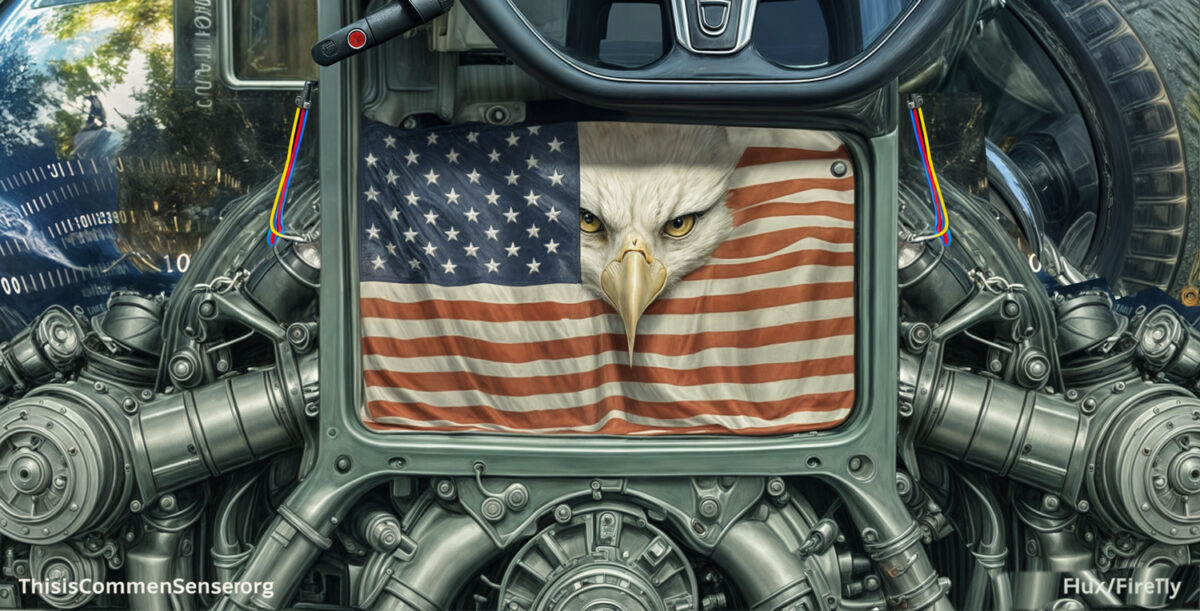Under the Biden administration, gas-powered vehicles were on a government-impelled road to decline.
In March 2024, the EPA finalized Biden’s “crackdown on gas cars” by issuing absurdly stringent emission standards. The idea was to advance the administration’s “climate agenda” by sending gas-powered modes of transportation to the junkyard.
Leaders of the petroleum industry were among those who saw that the scheme would “make new gas-powered vehicles unavailable or prohibitively expensive for most Americans.” The policy would “feel and function like a ban.”
This was just one of many examples of Biden-oppression pushing American voters who value at least their own freedom into the Trump camp.
Electric vehicles have pluses and minuses. In past columns, I’ve expressed much enthusiasm for the technology, but recognized that it must develop naturally, in a free market, rather than unnaturally, out of ideological hope and fear-ridden “need,” forced by government regulation and subsidy.
As James Roth has noted over at StoptheCCP.org, we’ve had a century and a half to fine-tune gas-powered vehicles, a mature technology that is “beloved by the public.” Why not let electric and gas cars compete fair and square in the market? And why give an artificial boost to totalitarian China’s heavily subsidized and promoted EV industry by crippling the gas-car industry here at home?
President Trump has heard the cry of those who prefer to step on the gas.
Section 2(e) of his sweeping executive order on “Unleashing American Energy” states that it is the policy of the United States to “eliminate the electric vehicle mandate … by removing regulatory barriers to motor vehicle access” and other thumb-on-scale interventions in the market.
Is the future of gas cars going to be great again?
This is Common Sense. I’m Paul Jacob.
Illustration created with Flux and Firefly
—
See all recent commentary
(simplified and organized)

4 replies on “Unplugging the EV Mandate”
Indeed, technologies can be employed or abandoned too early. The only technology of decision-making for approximating economic efficiency on the scale of a large community is the market.
Younger readers here will probably live to a time in which electric vehicles make excellent sense as the predominant form of transportation. But we are far from that era, and the human cost of trying to effect the change in ten or in twenty years would be very dire.
I don’t at all believe, though, that the intention was to convert from private petroleum-based transportation to private electric vehicles. I’m sure that the plan was to devastate production of gasoline-burning vehicles, then to admit that the infrastructure could not support many electrical vehicles, and so to compel the serfs to use mass-transit and to live in 15-minute cities. We were not to own anything, including cars.
I like the idea of electric vehicles — and on the low end, bicycles, they’re already achieving dominance. These days at least half the bikes I see out and about are electric, and most of the ones that aren’t are kids’ “neighborhood fun” bikes.
As for the higher end, I’d rather just let the market bring prices down and infrastructure up instead of the government gaming it all.
Even absent the gaming, I’d put the “dominance” angle at 10 – 20 years. Electric is already making pretty good sense for local driving and short commutes, other than the cost (if not subsidized).
If I was buying a new car, right now, I’d buy electric and invest in a home solar array for charging. Almost all of our family’s driving is within a 20-mile radius of home. When I needed a vehicle for a long road trip, I’d rent an internal combustion engine vehicle rather than having to map my route for charging and sit around waiting on it.
Close to 20 million unmotorized bicycles were sold in America in the last year. About 1.1 million electric bicycles were sold in America in the last year.
An electric bicycle is no more or less than an electric small-engine motorcycle, and a comparison of electric to non-electric small-engine motorcycles would be more telling.
But you live in an extraordinary community if most of the wheeled street vehicles that you see in everyday operation are not cars.
In San Diego, for a time rather a lot of electric bicycles were seen; then they nearly all vanished. Later, for a time a fair number of electric kick-scooters were seen; then they nearly all vanished. For a time, the only electric bicycle that I saw was one used by my friend Ric. I still see Ric, but he used that bike ever less, and I haven’t seen it in weeks. YMMV.
One of the biggest regulatory impediments is the different and arguably unconstitutional extra regulations placed on automobiles in order to be sold in California. One of the primary duties of the federal government specified in the Constitution is “to keep commerce regular”. IE to prevent states from imposing impediments for the products from one state in being sold in another state. Which is EXACTLY what California has done.
But instead of acting on that constitutional duty, the Commerce clause has been misinterpreted and misapplied to have the federal government decide that it can impose federal oversight and partisan participation on every single financial transaction in the country, while the actually irregular restrictions that California imposed have been cavalierly ignored.